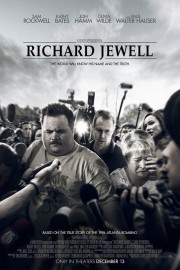Richard Jewell
I remember waking up the morning after the Centennial Park bombing during the Atlanta Olympics- some friends and I had tickets to shooting events that day. I remember hearing of Richard Jewell, and how he was the main suspect, even though he was the one who helped save people that night. I also remember him eventually being exonerated when they discovered the actual bomber, Erik Rudolph. I did not need Clint Eastwood’s film to remind me of these things; I wonder if Jewell would have felt the same way had he not died in 2007.
I cannot imagine what it was like for Jewell, a security guard whom always wanted to be a member of law enforcement, whether it was a police department or even the FBI, to be at the center of a federal investigation, where his reputation is destroyed, but it’s a credit to the performance by Paul Walter Hauser as Richard Jewell that we feel that anxiety, that stress, every step of the way after, 30 minutes into the film, a pipe bomb goes off during a concert in the Park, killing and injuring hundreds. He begins as a hero, but after an FBI leak, and an article in the Atlanta Journal-Constitution declares him the prime suspect, his life is turned upside down, and he and his mother (played by the always terrific Kathy Bates) always have press outside the apartment they share. The life they knew is over, and it’s hard to think they’ll manage to put it back together, even after Jewell hires Watson Bryant (Sam Rockwell), a lawyer Richard met a decade before while he was working a stock room at a law firm, to guide him through the investigation.
There’s been a lot of talk over the way Eastwood and screenwriter Billy Ray have portrayed the character of Kathy Scruggs, the AJC reporter who first wrote that Jewell as a suspect. Scruggs died in 2001, but they do not mention that in the post-script to their film, even though we get updates of Jewell, Watson and Jewell’s mother. The character is not well served during the movie, either. As played by Olivia Wilde, she is a brash, flirty firebrand who sleeps with Tom Shaw, Jon Hamm’s FBI agent, as a form of “payment” for the information she writes about Jewell, even though the film establishes a relationship prior to the moment. The article burns Shaw, as well, so when they meet later, after Scruggs realizes that Jewell could not have placed the bomb AND made the 911 call about it, Shaw is not really interested in cooperating. The film has been accused of playing Scruggs as a trope of a woman who uses sex to get information, and it’s a fair criticism, but so is the criticism Eastwood and Ray have for the way Jewell was railroaded by Scruggs and the FBI. A lot of people will take this film as commentary on the modern political climate; I would counter that Jewell is genuinely sympathetic, and worthy of our sympathy, whereas some people you may be thinking of are not.
Overall, “Richard Jewell” is a solid effort by Eastwood- it’s a Hell of a lot better than his last “true story” drama, “The 15:17 to Paris”- and a lot of that has to do with the ways that Hauser, Rockwell and Bates give us an emotional arc for these characters to go through as what looks like a heroic moment for Jewell becomes a nightmare. Eastwood may not have a balanced approach to his story in some cases, but let’s be honest, Jewell wasn’t afforded the same luxury, either, when it was happening. It’s hard to fault Eastwood for the way he told this story.










